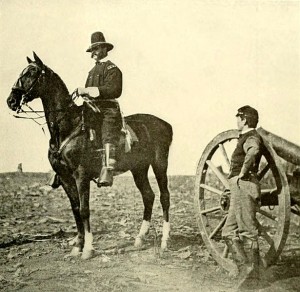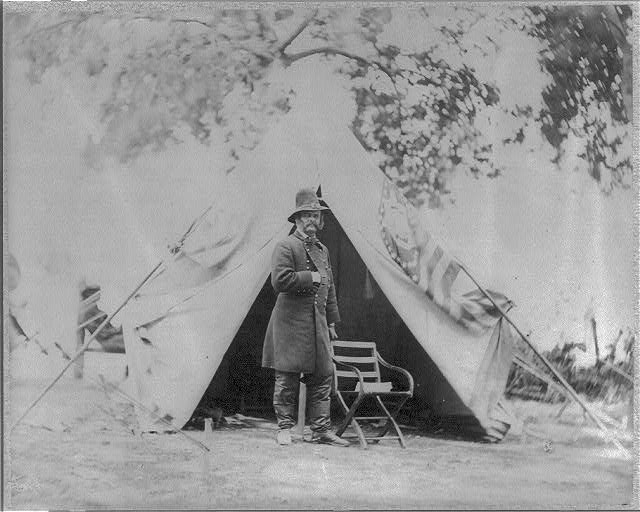The politics of recruitment.
From a Seneca County, New York newspaper in August 1862:
The Thirty-Third Regiment.
The Thirty-Third Regiment is commanded by brave and experienced officers. It has received honor and renown upon the field of battle. To-day it ranks second to no other regiment in point of discipline and gallantry. Disease and death, however, have so thinned its ranks, that barely half its maximum number remain to cope with the enemy. Shall this brave regiment suffer for the want of more men? Shall we quarrel and wrangle over the organization of a new regiment, when every consideration of justice demands that the 33d shall be recruited to its original strength? By no means. Capt. GUION and his heroic men are entitled to better treatment at our hands. Their pluck and gallantry, and heroism have called forth our gratitude and praise. Nobler and braver soldiers are nowhere to be found. Shall we not strengthen their hands before elevating to place men without experience or capacity? We cannot afford to organize a new regiment in this District for the purpose of creating positions for political favorites. The sacrifice would be too great.
Capt. MCGRAW is in want of more men. His company has been very much reduced and it should be a matter of pride for us to supply the places of those stricken down by disease and death. Capt. MCGRAW is a brave and true soldier. His company is a band of heroes, nobly and willingly fighting for the land of their adoption. Shall they be reinforced? That’s the question for us to determine, and at once. Gen. BURNSIDE, in his speech in New York, on Tuesday, said the best advice he could give was to “fill up the old regiments.” Do this, he said, and all will be well. Will it be done? Let the citizens of our vicinity determine whether the 33d Regiment shall be recruited to its maximum standard, or whether we shall fritter our strength away in quarreling over the organization of a new regiment that certain political favorites may obtain place and position.
It wasn’t just General Burnside. Footnote 4 at the the 1862 Northern Draft page at The American Civil War expands on Pennsylvania Governor Curtin’s belief that it would be easier to fill up the old regiments than form new ones because of the demand for men to help with the upcoming harvest:
This was an ongoing struggle throughout the recruiting and drafting in the North in those months: many in the Army and the government wanted to see the old regiments replenished. They argued that veterans could show new recruits the ropes more quickly, and McClellan estimated one recruit into an old regiment was worth two in a new one. The old established regiments also had valiant reputations that would be a spur to volunteers. But new regiments meant new commissions, new officers, and there was much political pressure in that direction.
In Battle Cry of Freedom James McPherson makes a similar point in discussing the confusing, carrot and stick approach of Northern recruitment in 1862:[1]
Most of the volunteers were recruited by the time-honored method of organizing new regiments with their complement each of thirty-odd officers’ commissions as political plums. Some of these new regiments became crack units by 1863, but in the process they had to go through the same high-casualty trial-and-error experiences as their 1861 predecessors.
As it turns out, Captain Guion of the old 33rd was going to become Lieut. Colonel of the new 148th New York Infantry Regiment, which Colonel William Johnson received authority to recruit on August 20, 1862.
- [1]Battle Cry of Freedom Ballantine Books, New York, 1989 pp.492-493↩



